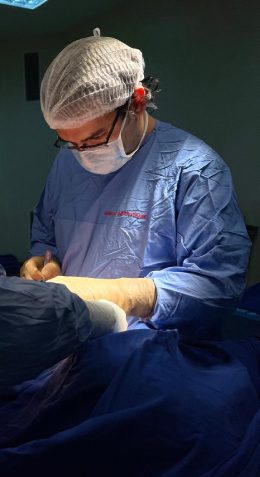Vulvoplasty
Vulvoplasty
Vulvoplasty:
Vulvoplasty is a surgical procedure performed to reshape or correct the outer part of the female genitalia, known as the vulva. In this procedure, excess tissue is often removed or deficient areas are repaired to improve the appearance and function of the vulva.
Why Is Vulvoplasty Performed?
Vulvoplasty can be performed for various reasons:
1. Congenital or acquired abnormalities: Some women may have congenital vulva abnormalities or develop deformities due to trauma, surgery, or other reasons throughout their lives. In such cases, vulvoplasty can be done to restore the normal appearance and functionality of the vulva.
2. Aesthetic concerns: Some women may prefer to undergo vulvoplasty due to aesthetic concerns about the vulval area. Changes in the appearance of the genital area can affect a person's self-confidence, necessitating surgical intervention.
How Is Vulvoplasty Performed?
Vulvoplasty is typically performed under local or general anesthesia. During the procedure, the surgeon makes incisions to correct or reshape the tissue and structures of the vulva. Excess tissue may be removed, or deficient areas may be filled. Surgical techniques and methods may vary depending on the patient's needs and the surgeon's preferences.
Is Vulvoplasty Permanent?
The results of vulvoplasty are generally permanent, but aging, hormonal changes, or other factors may cause changes over time. However, with proper care and regular check-ups, surgical results can usually be maintained for a long time.
What Is the Recovery Process After Vulvoplasty?
The recovery process after vulvoplasty can vary depending on surgical techniques, the patient's overall health, and the body's healing rate. Recovery typically takes several weeks, during which symptoms such as pain, swelling, and sensitivity are normal. It is important to follow the surgeon's recommendations, take hygienic measures to reduce the risk of infection, and avoid sexual activity.
Is Vulvoplasty Risky?
Like any surgical procedure, vulvoplasty carries some risks. The most common complications include infection, bleeding, tissue damage, and complications related to anesthesia. However, these risks can be reduced with the use of appropriate surgical techniques and the experience of the surgeon.
Is There an Age Limit for Vulvoplasty?
Generally, there is no specific age limit for vulvoplasty. However, the patient's overall health, hormonal status, and medical history are taken into account when deciding on surgery. Suitable candidates are usually healthy individuals, but this may vary based on the surgeon's recommendations.
Who Are Suitable Candidates for Vulvoplasty?
Suitable candidates for vulvoplasty are women who are concerned about abnormalities or aesthetic issues in the vulval area and desire surgical intervention. However, since each patient has unique needs and medical conditions, it is important to consult with a plastic surgeon to determine if you are a suitable candidate for vulvoplasty.


